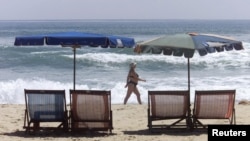An official in Vietnam's central city of Da Nang has admitted that local residents dodged laws to help Chinese citizens acquire coastal land facing the South China Sea.
Speaking to the city's main governing body last week, Dao Tan Bang, party chief of Ngu Hanh Son district, said 71 people were found to have helped Chinese citizens buy 137 lots along China Beach, known to Vietnamese as My Khe. My Khe is deemed by authorities as strategically sensitive in terms of security and defense.
The public acknowledgment, carried in state media reports, has sent shockwaves through Vietnam, where people are growing suspicious of China’s motives as Beijing pushes ahead with its massive territorial claims over the South China Sea.
Social activist and Da Nang resident Truong Duy Nhat told VOA his own investigation had found that Chinese citizens give money to local Vietnamese to buy real estate, because foreigners are not allowed to purchase land in Vietnam.
Nhat said the residents in Da Nang were extremely concerned about the developments and local authorities were facing a big dilemma.
“It is very difficult to prevent those kinds of transactions," he said. "They are Vietnamese and have money. How can we ban them? Nearly 200 plots of land near the military airport Nuoc Man are under the Vietnamese ownership, but they actually belong to the Chinese.”
Anti-China sentiments have continued to run high in Vietnam since Beijing said it would not cease building artificial islands in contested waters of the South China Sea.
Da Nang authorities have suspended a construction project operated by a Chinese company to review its height limit because it lies between two local military zones.
In a speech to key officials Tuesday, the city’s party chief, Nguyen Xuan Anh, urged relevant agencies to tighten land management in areas sensitive to security and defense.
He said high-rise buildings should not be built in the zones where many Chinese have reportedly acquired land.
Meanwhile, social activist Nhat said some other localities were facing similar issues.
“All over Vietnam, especially in strategic areas like in Ha Tinh province [about 40 kilometers from Da Nang], the Chinese came in and built up exclusive and concentrated zones," he said. "The bauxite mining projects on the highlands are in the hands of the Chinese businesses. It is very questionable and worrisome.”
Beijing sent ships to evacuate thousands of its citizens working in Ha Tinh last year following rioting that hit Chinese-owned businesses, as well as other foreign operations. The deadly riots were triggered by outrage over China's placement of an oil rig in disputed waters last year.
This report was produced in collaboration with VOA's Vietnamese service.




